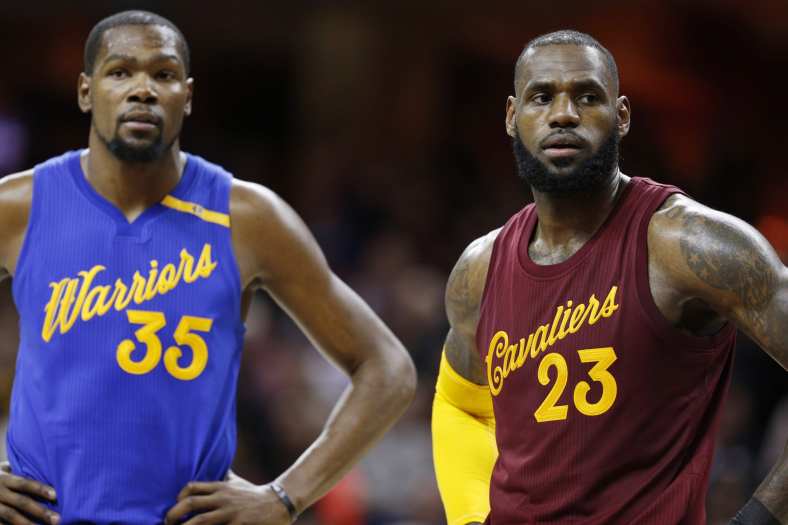
Perhaps the most frequent criticism lobbed by those who love to hate the National Basketball Association is the lack of parity within the league.
As things stand today, the Golden State Warriors are -225 to win the title, per Vegas Insider. The Cleveland Cavaliers are +350 and the San Antonio Spurs, with the third-best odds, are +1200. Saying that there is a lack of parity within the league is objectively true — and has been throughout the history in the league, with few exceptions.
The Golden State Warriors and Cleveland Cavaliers will probably be in the NBA Finals again, and that’s okay (perhaps even desirable).
The NBA’s lack of parity isn’t a bad thing, it’s a virtue.
First, let’s dispel the notion that a lack of parity makes the regular season less fun or interesting. There are a bevy of intriguing NBA plot lines at a given time, even more so than other sports because of the league’s penchant for operating like a reality TV show.
On a given night, you can see a Stephen Curry heat check, a 25-point Isaiah Thomas fourth quarter, a Giannis Antetokounmpo free throw line dunk and a Twitter fight between Shaquille O’Neal and JaVale McGee. We may be pretty sure the Warriors are winning the Western Conference, but that doesn’t make the Houston Rockets’ hopped up pick-and-roll offense any less fun to watch.
There’s also the added intrigue of every team knowing they have to beat Golden State or Cleveland. Every move the Toronto Raptors or Boston Celtics make (or don’t make) carries that weight. Reports indicate the Raptors added P.J. Tucker at the deadline so that he could guard LeBron James in a potential series. Common sense indicates the Celtics didn’t pull the trigger on a potential Jimmy Butler or Paul George trade because they didn’t feel it could put them over the top.
Just because there are two massive favorites doesn’t mean the other 28 teams stop operating. Across the league, there’s constant hypothesizing, strategizing and trading, all of which makes a difference.
 On March 19 of last season, with the Warriors even bigger favorites than they are now, Gregg Popovich figured out how to beat them. He started Boris Diaw, putting Tim Duncan on the bench, and switched everything on defense. The San Antonio Spurs got physical with Stephen Curry off the ball and forced him into isolations with the ball, ultimately holding him to 1/12 from beyond the arc and holding the Warriors to just 79 points, their lowest mark of the season.
On March 19 of last season, with the Warriors even bigger favorites than they are now, Gregg Popovich figured out how to beat them. He started Boris Diaw, putting Tim Duncan on the bench, and switched everything on defense. The San Antonio Spurs got physical with Stephen Curry off the ball and forced him into isolations with the ball, ultimately holding him to 1/12 from beyond the arc and holding the Warriors to just 79 points, their lowest mark of the season.
A few weeks later, the Minnesota Timberwolves tried the same thing and pulled off the upset in overtime. During the playoffs, the Oklahoma City Thunder did it and pushed the Warriors to the brink. Then the Cavs rinsed, repeated and exited Oracle Arena trophy in hand.
The regular season matters because it’s an 82-game experiment where good teams try to figure out how to beat great teams. And sometimes, they succeed.
A lack of parity also makes for better playoffs. Maybe we’ll have to deal with an uninteresting Warriors-Nuggets first-round series. But a Rockets-Spurs series in Round Two is a scintillating prospect. High-level playoff basketball is among the best sporting competition in the world.
During the entire 1980’s, only five teams made the Finals, but no one in their right mind would complain about a lack of interesting match-ups besides Los Angeles Lakers and Boston Celtics.
In fact, the least interesting parts of NBA history feature the most parity.
The 1970’s stunk, in part because there were no defining teams of the decade. Each time a potential dynasty came along, it flamed out due to injuries (Portland), its superstar leaving (Milwaukee), age (Los Angeles), or a combination of injuries and age (New York and Boston).
The years from 2003-2007 were terrible mostly because of the style of play, but also because there was no giant to take down. Yes, the Spurs won three titles in that span, but they came in three of the least-interesting Finals series to date, which were preceded by three of the least-interesting playoffs to date.
Take a look at the 2007 playoffs and you’ll find an embarrassingly small number of interesting games. There’s Golden State beating the Dallas Mavericks as a No. 8 seed (a memorable series with only one close game), a solid Game 7 in Round One between the Utah Jazz and Houston Rockets, a Suns-Spurs Round Two series that’s only interesting now because Tim Donaghy was involved and some fishy calls went San Antonio’s way, and LeBron James’ 48 points in Game 5 of the Conference Finals against the Detroit Pistons.
Parity produces a league that isn’t memorable and teams that aren’t historic. It’s worth sacrificing a super-competitive regular season for a historic playoffs. If you still don’t believe that, take a look at the past NFL season.
The Super Bowl, contested between two great teams, was one of few competitive bright spot of the entire playoffs. The parity which the NFL loves to brag about produced a Wild Card Round featuring the Houston Texans, Miami Dolphins, and Detroit Lions — three teams that just weren’t very good, say nothing for quarterback injuries that crippled the Dolphins and Oakland Raiders.
Parity produced three blowouts in the Divisional Round (out of four) and two blowouts on Championship Weekend (out of two).
Don’t knock the NBA for a lack of competitive balance. Extol it.